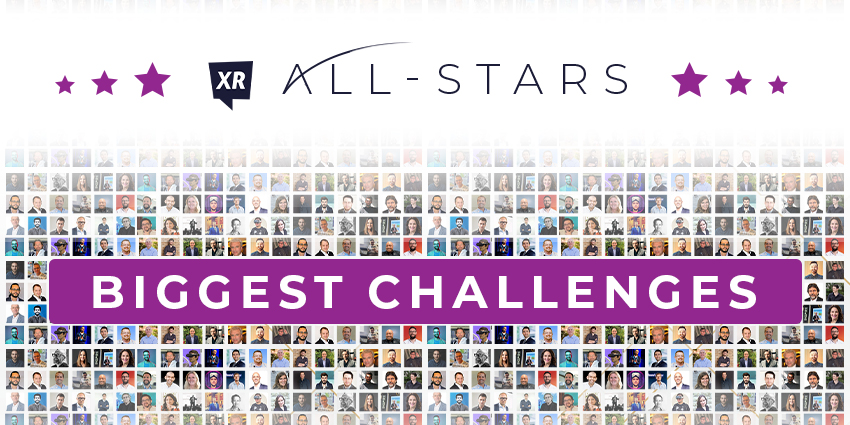
Paul Jones
VP, Technology Strategist, Life Sciences
Immerse.io
Paul Jones
What has been your business/work highlight of 2024 so far?
The feedback of clients in relation to the impact they’ve been able to measure and the reactions of their employees to training in VR. One told me just this week how they’d experienced production deviations (not a good thing) and to address this they’d been able to re-train everyone in the new VR experience in a matter of days, rather than what would have taken weeks of classroom training. They saw an immediate impact, that’s game changing.
Who is your business hero and why?
Gabriel Rene, he took the disparate threads from so many technology concepts and ideas in books and movies and turned them into the Spatial Web (book), with Dan Mapes. But then he went beyond that by giving away the rights to the protocols and very concept of Spatial Computing, partnering with the IEEE could to create standards which could very well become the foundation of the 4D Spatial World which future generations will call home. He’s also behind Verses.ai and the team there working on active inference, this is the future of AI and the foundation of what most of us will come to know as our personal AI agents, not the highly inferior and limited GPT models we know today. Why? WEF, WHO, EU and many more global entities are working with Gabriel and his team, it’s clear the aspirations and the buy-in go beyond many of the one off technology products we normally see.
What’s the biggest business mistake you’ve made and what did you learn from it?
I’m sure I’ve made many and there isn’t one which stands out from memory. I remember once trying to present a hearts and minds argument to some senior stakeholders, having misread that they had already bought in. Instead I got grilled on the numbers for an hour and the feedback was simple “know your audience, and always know your numbers” and I’ve never forgotten it.
What’s the most inspirational book you’ve ever read and why?
The Diabetes Solution by Dr Richard K Bernstein, as someone with Type 1 it taught me that there is life after a Type 1 diagnosis late in life. But his story is also a remarkable one. Diagnosed as a child at a time when no technologies existed for measuring blood sugars, he recognised the damage sugar does even if you inject insulin. He drank his own urine to taste for sugar, learning which foods affected him. When his wife, a doctor told him her practice had a machine which could measure blood markers he began to test as regularly as he could. He wrote about what he learned, but was told he didn’t have a Doctors Licence so couldn’t be published. So he studied and became a doctor, only to find the endocrinologists (blood specialists) wouldn’t recognise his work. So you guessed it, he became an endocrinologist. His resilience taught me that despite never having gone to university, I to could take on that challenge, so during covid I spent 2 years studying and completing with distinction an MBA.
What’s the biggest challenge you face in your role in 2024?
Two things, firstly; a simple tightening of belts by major organisations as companies near-shore and react to well documented post pandemic economic challenges, so many companies seem to be re-organising right now, lots of change. Second; a lack of knowledge, most of the people I speak to about VR are only thinking about XR (AR and VR) in the context of internal use cases. It’s like finding a unicorn if someone I speak to is thinking about “next phase” and external use cases for their customers. Even rarer still, someone thinking about the data insights (metadata) from those customer interactions with their VR products. And they certainly aren’t considering trust, governance, compliance, privacy, security, Data and IP loss, cost avoidance etc. It’s a huge educational journey to understand the complexities of the XR ecosystem. Let alone the significant strategic opportunities for platform and technology simplification of their companies existing platforms. That is a huge, but critical strategic leap which C-suite, CIO’s, IT Departments, Architects, and the budget holders need to comprehend. For many these changes will require further wholesale internal re-organisations of their own.
What technology will have the greatest impact on your business this year and why?
Artificial Intelligence, decision makers have been sold on it being a silver bullet, without understanding the convergence of technologies I mentioned previously. Going all in on AI is like building, decorating and furnishing the house of your dreams without any doors or windows. How can your employees or customers “immerse themselves in it”? An AI model with no one interacting with it is pretty worthless, if you enable people to look in the window you’ll gain some data to help train the model. But you open a door using XR (VR & AR) and so long as you have the trust and governance in place, your customers will come inside, interact and that data is far richer, infinitely more valuable. Have a look at the Swim Lane article on my LinkedIn profile for more thoughts on this.


